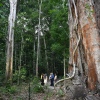
Kristine Tompkins, founding father of Tompkins Conservation, hikes as much as the Cross of the Seas situated within the southernmost level of South America, in Patagonia, Chile, on Nov. 2, 2024.
Tamara Merino for NPR
disguise caption
toggle caption
Tamara Merino for NPR
BRUNSWICK PENINSULA, Chile — The rugged shores and icy forests on the tip of the Brunswick Peninsula in southern Chile are quickly to be the cornerstone in a protracted route of nationwide parks and mountain ranges that extends down by way of Patagonia.
In March this 12 months, 315,000 acres round Cape Froward, the southernmost level of the South American continent, will turn out to be Chile’s forty seventh nationwide park.
The initiative is largely due to the efforts of U.S. conservationist and philanthropist Kristine Tompkins, and can turn out to be the newest step in her mission to guard one of many final actually wild locations on Earth.
“If you come to locations like this, you begin to really feel very small, and also you notice how we’re only a tiny a part of all life on our planet,” Tompkins says in a sheltered hole beneath the towering Cross of the Seas.

The Cross of the Seas is situated within the southernmost level of South America, in Patagonia, Chile.
Tamara Merino for NPR
disguise caption
toggle caption
Tamara Merino for NPR

A portrait of Kristine Tompkins, founding father of Tompkins Conservation, in Patagonia, Chile, on Nov. 3, 2024.
Tamara Merino for NPR
disguise caption
toggle caption
Tamara Merino for NPR
The large metallic cross was erected on the southernmost level on the continent in 1987 to mark the go to of Pope John Paul II to Chile. The howling wind sings because it whips by way of the creaking construction.
The hike as much as the cross is tough and swampy, with Tompkins and her workforce stepping between tufts of grass, whereas the glassy water alongside the shoreline laps quietly on the stony seashore beneath.
“We have had lots of success as a species, however we’ve got achieved a hell of lots of injury too and the tempo is selecting up,” Tompkins says.

Members of the Cape Froward expedition group hike greater than 5 miles from Cruz de los Mares to Río Nodales, dodging and climbing fallen bushes which have blocked the trail between the forest and the ocean, on Nov. 3, 2024.
Tamara Merino for NPR
disguise caption
toggle caption
Tamara Merino for NPR
“The extra we perceive about who and the place we’re on this Earth, and what our position is, the higher shot all life has of being in a single piece in 100 or 200 years’ time.”
Defending locations like Cape Froward are key to her imaginative and prescient.
Almost 20% of the realm is peatland, which absorbs carbon and filters groundwater. Pristine native forests attain proper right down to the shores, the place inexperienced frills on the floor are the one trace of the sprawling kelp forests beneath the tides.

A member of the Cape Froward expedition group walks alongside the steep, rugged shoreline, on Nov. 3, 2024.
Tamara Merino for NPR
disguise caption
toggle caption
Tamara Merino for NPR

A path alongside an space of peat bogs, that are dense wetlands full of partially decayed vegetation.
Tamara Merino for NPR
disguise caption
toggle caption
Tamara Merino for NPR
Within the distance throughout the Strait of Magellan, the glaciers that cap the Darwin Vary glint within the afternoon solar.
Kristine Tompkins got here to Chile for the primary time in early 1993 along with her husband Douglas Tompkins, who co-founded the North Face and Esprit clothes corporations. He died in a kayaking accident in 2015.
Via Rewilding Chile and Rewilding Argentina, in addition to their mother or father group Tompkins Conservation, they’ve helped create 15 nationwide parks, together with two marine parks between the 2 nations — defending 14.8 million acres of land and 30 million acres of ocean.

Kristine Tompkins, founding father of Tompkins Conservation, and her workforce analyze the map of the long run Cape Froward Nationwide Park with a purpose to make choices on the place sure amenities must be situated and which areas ought to stay protected in Patagonia, Chile, on Nov. 3, 2024.
Tamara Merino for NPR
disguise caption
toggle caption
Tamara Merino for NPR
And Kristine Tompkins herself has the outstanding means to make these round her really feel like they’ve been strolling alongside all through her journey. Her curiosity is boundless, be it kneeling to look by way of portholes streaked with water because the boat out to the peninsula sways by way of the waves, or trying to find heart-shaped rocks on the seashore for her assortment.
Cape Froward would be the sixteenth nationwide park Tompkins Conservation has helped create.
“We began off by buying land as and when it got here onto the market,” says Marcela Quiroz, Rewilding Chile’s director of strategic partnerships, within the dappled shade of a coihue forest.

The night mild illuminates the forest in Patagonia, Chile.
Tamara Merino for NPR
disguise caption
toggle caption
Tamara Merino for NPR

Pastures adorn the panorama alongside the Río Nodales, creating a mirrored image at sundown.
Tamara Merino for NPR
disguise caption
toggle caption
Tamara Merino for NPR
“The primary main buy we made was practically 94,000 hectares in 2021 which we purchased from a neighborhood household,” she says, which is about 363 sq. miles or greater than 232,000 acres. “We wish to hold working to finish this puzzle.”
An area landowning household was trying to promote a part of their property, and even posted the property itemizing in The New York Instances. However when Tompkins Conservation known as, they lowered their value, enthused by the concept that the realm can be protected.
Two months later, the group purchased up a second piece of land, this time 84,000 acres, after which in March 2024, the Chilean authorities signed an settlement to create the park and annex two chunks of state-owned land at every finish.
“For us, nationwide parks are a large-scale conservation technique,” explains Quiroz. “However this doesn’t imply that we’re freezing the native economic system, the thought is to have the ability to develop different financial actions in concord with biodiversity.”

Members of the Cape Froward expedition group take photos of the panorama in Patagonia, Chile, on Nov. 3, 2024.
Tamara Merino for NPR
disguise caption
toggle caption
Tamara Merino for NPR
Chile’s nationwide forestry fee, which is able to ultimately take over the administration of the park, is finishing its administrative processes. An Indigenous session will comply with, earlier than the park opens later this 12 months.
“This complete hall makes up 8 million hectares of protected land,” Quiroz says proudly — virtually 20 million acres.

Benjamín Cáceres, marine biologist and conservation coordinator of the group Rewilding Chile, crosses a river over fallen bushes on Nov. 4, 2024.
Tamara Merino for NPR
disguise caption
toggle caption
Tamara Merino for NPR

Benjamín Cáceres, marine biologist and conservation coordinator of Rewilding Chile, places his hand on a local tree contained in the forest, on Nov. 4, 2024.
Tamara Merino for NPR
disguise caption
toggle caption
Tamara Merino for NPR
Past their work creating parks and conservation areas, Rewilding Chile and Rewilding Argentina have reintroduced species which were pushed to native or nationwide extinction, together with jaguars, red-and-green macaws, big river otters and Darwin’s rheas.
There may be even a inhabitants of the critically endangered huemul deer at Cape Froward, though little is understood about it. A community of digicam traps and sound recording gadgets has been set as much as assess their soundscape and motion.

Portrait of Carolina Morgado, government director of Rewilding Chile in Patagonia, Chile, on Nov. 3, 2024.
Tamara Merino for NPR
disguise caption
toggle caption
Tamara Merino for NPR
“In 100 years I believe we’ll look again and be pleased with what Douglas and Kristine have achieved, and they are going to be massive characters in Chilean historical past,” says Carolina Morgado, government director of Rewilding Chile. “I really feel proud that they’ve chosen Chile to focus their conservation efforts.”
Nationwide parks are the best stage of conservation standing in Chile. The nation’s first park was created in 1926, and right this moment the nationwide forestry fee oversees 109 protected areas.
Each president since 1926 has created not less than one nationwide park, and Cape Froward shall be President Gabriel Boric’s probability to guard a swath of his dwelling area, Magallanes.
Proof of the lengthy human historical past of this windswept shoreline of Cape Froward, and there are sometimes scars on the oldest bushes the place the Kawésqar folks stripped away the bark to line their canoes. At Bahía del Águila are the stays of a Nineteenth-century whaling station.

A window view from contained in the San Isidro Lighthouse, which is situated on the southern tip of the Brunswick Peninsula, within the area of Magallanes and Chilean Antarctica in Chile, with the Darwin Mountain Vary within the background.
Tamara Merino for NPR
disguise caption
toggle caption
Tamara Merino for NPR

Whale bones discovered on the shores of the Strait of Magellan are displayed contained in the San Isidro Lighthouse, on the southern finish of the Brunswick Peninsula in Chile.
Tamara Merino for NPR
disguise caption
toggle caption
Tamara Merino for NPR
And within the subsequent bay is one among eight lighthouses constructed alongside this shoreline by Scottish architect George Slight to information ships by way of the perilous Strait of Magellan. Will probably be become a museum and customer middle to type the entry level to the brand new nationwide park.
For now, the skeleton of a feminine humpback whale is laid out on the ground of the lighthouse, and three canoes are propped up in a single wing of the outdated constructing.
Tompkins says she is proud to be handing over to the following era of conservationists.

Kristine Tompkins, founding father of Tompkins Conservation, inside Chile’s San Isidro Lighthouse, on Nov. 5, 2024.
Tamara Merino for NPR
disguise caption
toggle caption
Tamara Merino for NPR
“It seems like an incredible accountability,” says Morgado. “This goes means past creating nationwide parks. It is about putting in a imaginative and prescient about how we, as residents, can become involved in defending the land and its biodiversity.
“And that, to me not less than, is essential.”







